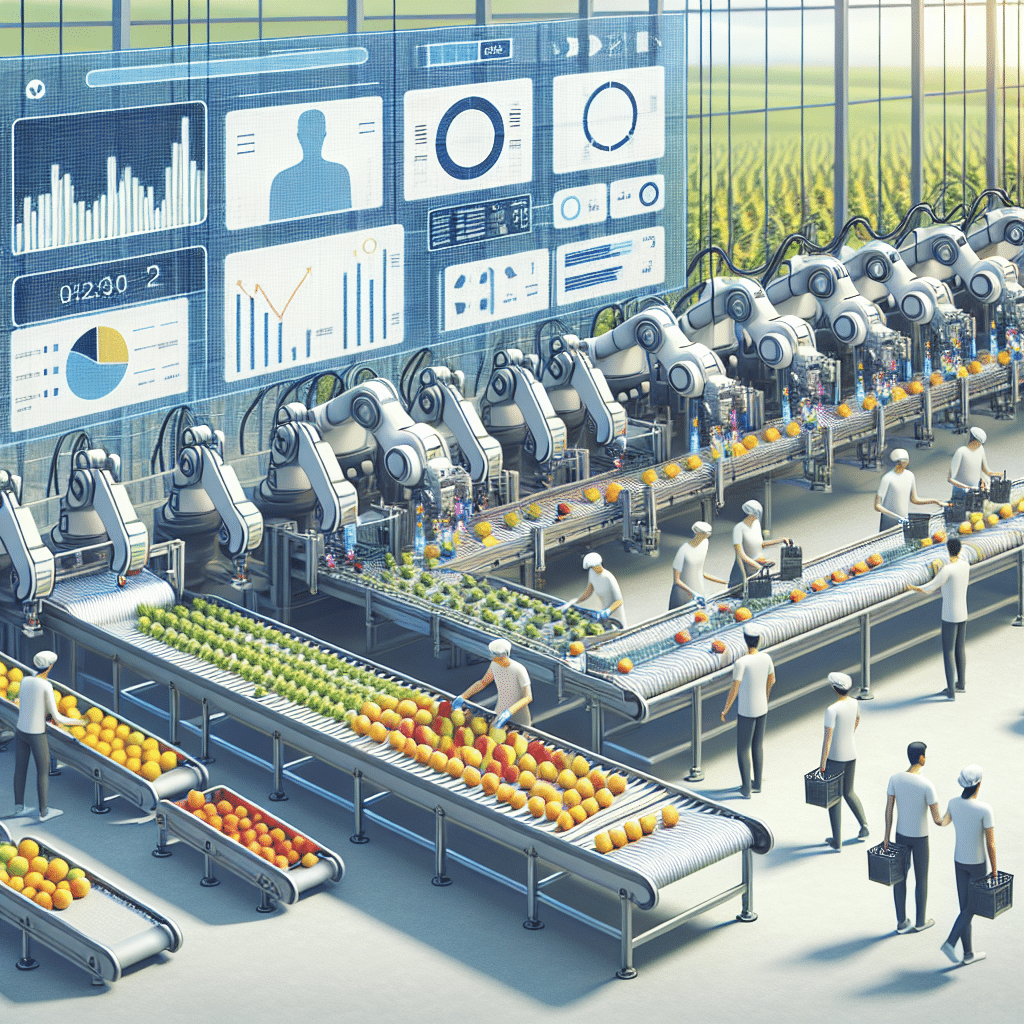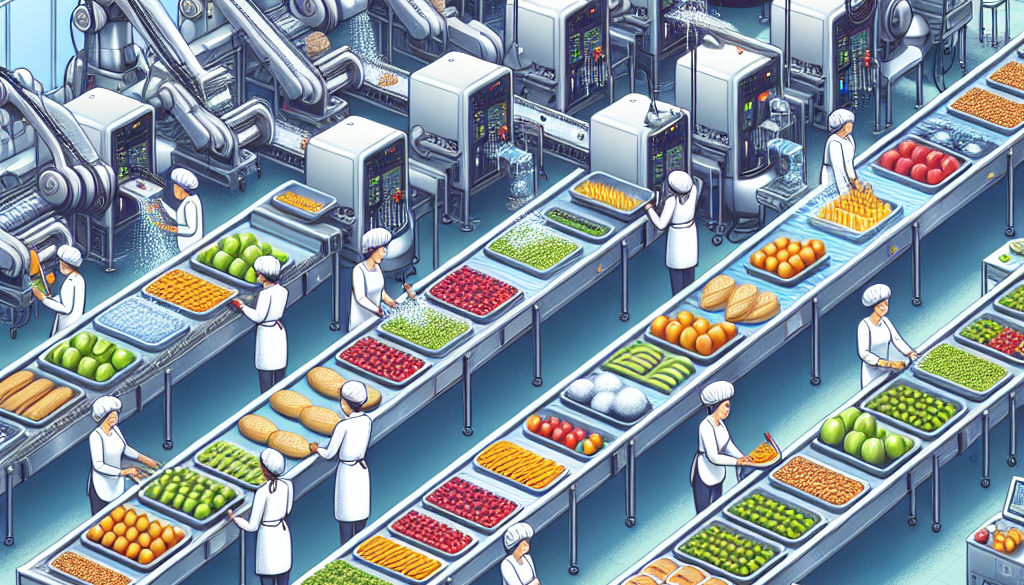Boosting the Food Industry Efficiencies With the Help of Automation.
-
Table of Contents
- Automation: A Game Changer for Food Industry Efficiency
- The Rise of Automation in Food Processing and Packaging
- Key Areas of Impact
- Statistics That Showcase the Impact of Automation
- Challenges and Solutions in Implementing Automation
- Case Studies: Success Stories of Automation in the Food Industry
- Future Trends: Where Automation in the Food Industry is Headed
- Conclusion: Embracing Automation for a More Efficient Food Industry
- Boost Your Food Products with ETprotein’s High-Quality Proteins
Automation: A Game Changer for Food Industry Efficiency

The food industry is a cornerstone of the global economy, feeding billions and generating trillions in revenue. However, it’s also a sector that faces immense pressure to improve efficiency, reduce waste, and meet ever-increasing consumer demands. Automation has emerged as a transformative force in this quest, offering innovative solutions that can significantly enhance productivity and sustainability. In this article, we’ll explore how automation is revolutionizing the food industry and the benefits it brings to the table.
The Rise of Automation in Food Processing and Packaging
Automation in the food industry isn’t a new concept, but its adoption has accelerated in recent years. Technological advancements have made automated systems more accessible and cost-effective, allowing even small and medium-sized enterprises to integrate them into their operations. From robotic arms sorting and packaging products to AI-driven quality control systems, automation is reshaping how food is processed, packaged, and distributed.
Key Areas of Impact
- Production Line Efficiency: Automated machinery can operate at a constant pace without fatigue, significantly increasing the speed and consistency of production lines.
- Quality Control: Advanced sensors and machine learning algorithms can detect defects and contaminants with greater accuracy than the human eye, ensuring higher quality standards.
- Inventory Management: Automated systems can track and manage inventory in real-time, reducing waste and optimizing stock levels.
- Supply Chain Optimization: Automation facilitates better coordination and communication across the supply chain, leading to smoother operations and reduced delays.
Statistics That Showcase the Impact of Automation
According to a report by the Association for Packaging and Processing Technologies (PMMI), the food packaging machinery market is expected to grow at a CAGR of 4.3% from 2020 to 2025. This growth is partly driven by the increasing adoption of automation. Moreover, a study by Meticulous Research predicts that the food automation industry will be worth $29.4 billion by 2027, underlining the significant investment and confidence in automated technologies.
Challenges and Solutions in Implementing Automation
While the benefits of automation are clear, integrating these systems into existing operations can be challenging. Concerns about the initial investment costs, potential job displacement, and the need for skilled personnel to manage automated systems are common. However, solutions such as phased implementation, retraining programs for workers, and partnerships with technology providers can help mitigate these challenges.
Case Studies: Success Stories of Automation in the Food Industry
Many companies have successfully integrated automation into their operations. For instance, a leading dairy company implemented robotic milking systems, resulting in a 20% increase in milk production. Similarly, a bakery used automated mixing and baking systems to boost its output by 30% while maintaining consistent product quality.
Future Trends: Where Automation in the Food Industry is Headed
The future of food industry automation is bright, with trends pointing towards even more sophisticated technologies. We can expect to see the rise of collaborative robots (cobots) working alongside humans, greater use of AI for predictive maintenance, and the integration of the Internet of Things (IoT) for enhanced data collection and analysis.
Conclusion: Embracing Automation for a More Efficient Food Industry
Automation presents a compelling opportunity for the food industry to boost efficiency, improve product quality, and meet the evolving needs of consumers. By embracing these technologies, food producers can position themselves for long-term success in an increasingly competitive market. The key takeaways include the need for strategic implementation, the importance of workforce adaptation, and the potential for significant ROI through increased productivity and reduced waste.
Boost Your Food Products with ETprotein’s High-Quality Proteins
If you’re in the food industry looking to enhance your product offerings, consider ETprotein’s range of high-quality protein products. Their organic bulk vegan proteins and L-(+)-Ergothioneine are perfect for a variety of applications, from sports nutrition to health and wellness products. With non-GMO, allergen-free attributes, and high purity levels, ETprotein’s products can help you meet consumer demands for clean, sustainable, and nutritious food options.
About ETprotein:
ETprotein, a reputable protein and L-(+)-Ergothioneine (EGT) Chinese factory manufacturer and supplier, is renowned for producing, stocking, exporting, and delivering the highest quality organic bulk vegan proteins and L-(+)-Ergothioneine. They include Organic rice protein, clear rice protein, pea protein, clear pea protein, watermelon seed protein, pumpkin seed protein, sunflower seed protein, mung bean protein, peanut protein, and L-(+)-Ergothioneine EGT Pharmaceutical grade, L-(+)-Ergothioneine EGT food grade, L-(+)-Ergothioneine EGT cosmetic grade, L-(+)-Ergothioneine EGT reference grade and L-(+)-Ergothioneine EGT standard. Their offerings, characterized by a neutral taste, non-GMO, allergen-free attributes, with L-(+)-Ergothioneine purity over 98%, 99%, cater to a diverse range of industries. They serve nutraceutical, pharmaceutical, cosmeceutical, veterinary, as well as food and beverage finished product distributors, traders, and manufacturers across Europe, USA, Canada, Australia, Thailand, Japan, Korea, Brazil, and Chile, among others.
ETprotein specialization includes exporting and delivering tailor-made protein powder and finished nutritional supplements. Their extensive product range covers sectors like Food and Beverage, Sports Nutrition, Weight Management, Dietary Supplements, Health and Wellness Products, and Infant Formula, ensuring comprehensive solutions to meet all your protein needs.
As a trusted company by leading global food and beverage brands and Fortune 500 companies, ETprotein reinforces China’s reputation in the global arena. For more information or to sample their products, please contact them and email sales(at)ETprotein.com today.














